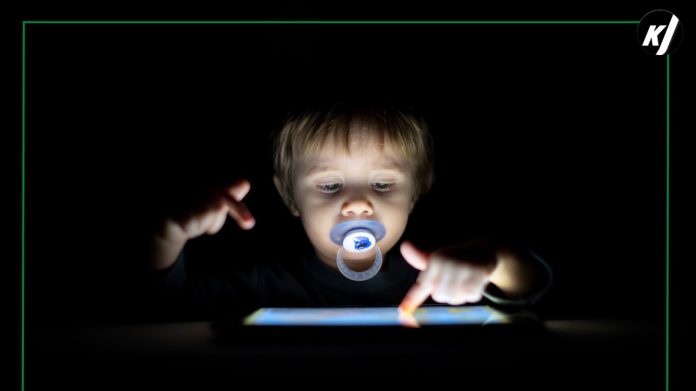In his article Aid for bored parents, an Abu Dhabi-based expert has urged parents to refrain from using technology as a way of halting their kids from crying. Children as young as two may carry phones or other electronics, during meals or for other reasons.
“For example, the child cries, so a parent gives their phone to the child to keep him or her quiet,” Maryam Hassani, acting head of Trends & Innovation at Abu Dhabi’s ECA said in an interview.
More recent research that has appeared in the Frontiers in Child and Adolescent Psychiatry journal refers to practice as ‘digital pacifiers’, whereby parents use gadgets to calm children and prevent tantrums.
While it helps on the short term, ‘emotional modulation’ does not take place and therefore, the child will have a ‘poorer effortful control and anger management’. It may lead to what may be referred to as ‘increased dependence’ on the digital device, ‘screen time tantrums,’ and screen dependency.
Hassani also encouraged the parents to be cautious of their use of gadgets around the youngsters. ‘If a child sees that a phone or tablet is one of the devices which becomes most often used in moments of stress, he will try to do the same.’
Beside, young children are extremely imitative; what they hear and see they copy it; observing nurses making eye contact and directly interacting with the child, without distractions, such as television, builds up a better relationship with the child, thus making the child realize that he/she is valuable and needed.
Instead, she urged parents to treat screen based games in the same manner as physical games which include such traditional toys as blocks or puzzles.
“Choose simple and informative games that you can play with your kid at the same time as this not only will makes the time spent in front of the screen purposeful but also will help to improve the connections between the generations.”
According to Severin, Directo, and Eger, as discussed in ‘Mobile Tomorrow,’ is there a ‘right age’ for devices?
At seven, children in the UAE are some of the youngest in the world starting with their first mobile device, as a study by Norton shows.
The ‘My First Device’ report also found that children in the country desire mobile screen time more than candy or sweets.
Hassani said that deciding when to give kids their first phones and how much screen time to allow isn’t a one-size-fits-all scenario.
“The type of screen time matters. Are they using it for educational apps, connecting with family, or just scrolling through social media? Each serves a different purpose and has different impact.”
On this she urged parents to assist children to be good citizens in this digital age. “For a balance, have to consider their time as a whole, they need time for play outside, exercise, schoolwork, reading, socialization, and sleep. Screen time is a part of that not the boss of everything.”
Using screens for learning
About this, Maryam encouraged parents to use various opportunities of the Internet and social networks for upbringing and education of children. “Don’t make a leap and go to a new app or a new game and you just get it and start playing: instead, just think, will this be helpful for my child, will this develop the child, will this cause him or her to grow or learn; so if you have found an interactive application that can help with imaginative play, or setting goals, or exploring oneself, then these types of applications, in addition to being fun,
She also urged the incorporation of such straightforward practices in the home as no-device eating. “It also helps create bonding with family and develop some essential interpersonal skills in your kid, Therefore, you are preparing your kid for creating meaningful conversation and better interaction with technology.”
Analog tools
To illustrate the two analog tools that assist in the reduction of screen time Maryam said:
“There is an illustrative app called Storybutton, which is designed as a screenless audio player for kids, for example. This brilliant invention allows for all sorts of audio content – podcasts, audiobooks, and other narratives, but it is free from screens. The emphasis here is on the further development of children’s fantasy and on the desire to listen more and more. “
“Zenimal, which belongs to the screen-free applications, presents a haven for mental health. It is a portable device that offers kids meditations and sleep sounds when they need to calm down, focus or just fall asleep. Stating that it is oriented to children, Zenimal uses a calming voice and simple terminology throughout the application.”
Rise in screen time sparks anxiety, depression, and vision problems in kids during summer holidays
They are both graduates of the ECA’s Anjal Z Techstars Founder Catalyst program, which supports early childhood development companies from around the world.

